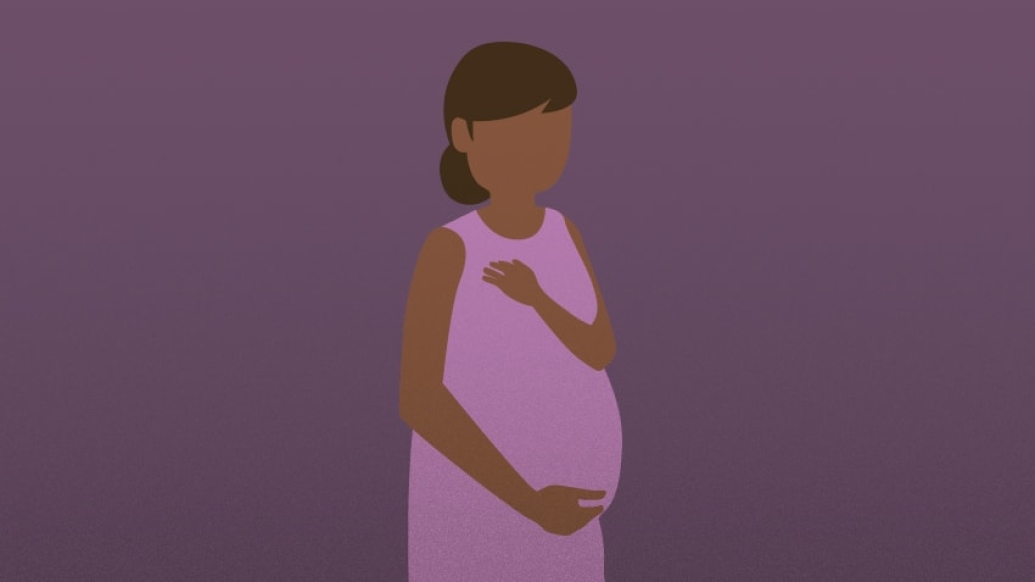Women with ACHD who are considering having a baby need to be especially vigilant with their health care. An expert explains what to know.
7:00 AM
Author |

The majority of women with congenital heart disease can have a successful pregnancy with proper care before, during and after pregnancy. But for some women with certain types of CHD, pregnancy may carry high risks for both the mother and baby.
LISTEN UP: Add the new Michigan Medicine News Break to your Alexa-enabled device, or subscribe to our daily audio updates on iTunes, Google Play and Stitcher.
Regardless of their condition, Timothy Cotts, M.D., Michigan Medicine Adult Congenital Heart Disease Program director, advises all CHD patients to be assessed before becoming pregnant. A careful evaluation will help determine whether a woman can tolerate the cardiovascular changes caused by pregnancy and delivery, he says.
Here, Cotts addresses many of the questions posed by his female CHD patients.
I have congenital heart disease. Is it safe for me to get pregnant?
Cotts: Most patients with congenital heart disease do quite well, depending on the complexity of their disease, functional status and heart function.
Patients with CHD should be evaluated prior to pregnancy to assess their risks and discuss anticipated issues during the pregnancy. This assessment, which should be conducted at an adult congenital heart disease (ACHD) center, includes a history and physical exam. Additional testing may include an ECG (electrocardiogram) and echocardiogram. Other tests such as a cardiac MRI would be considered based on a patient's diagnosis and overall status. A review of all medication to check for adverse fetal effects and a plan to manage anticoagulation medication, if required, are also important.
Whether the patient is already pregnant or planning to become pregnant, we develop a comprehensive, individualized plan for delivery and postpartum monitoring. A multidisciplinary team — consisting of high-risk obstetricians, obstetric anesthesiologists and cardiologists — works closely to identify important pregnancy-related issues for each patient.
When is pregnancy considered too dangerous for a woman with CHD?
Cotts: Pregnancy is generally considered prohibitively high risk in the presence of:
-
Severe pulmonary hypertension
-
Severely decreased heart function
-
Significant enlargement of the aorta, especially in women with Marfan's syndrome or other genetic syndromes
-
Severe aortic stenosis, mitral valve stenosis or other valve issues
What are the recommendations for patients with single-ventricle congenital heart disease?
Cotts: Patients with single-ventricle hearts are considered high risk for pregnancy, although they generally tolerate pregnancy well. They should be followed at a center experienced in the care of women with complex heart disease. It is reasonably common for babies to be born several weeks prematurely and to be small for gestational age.
Will my child be at risk for a heart defect or condition?
Cotts: Women with congenital heart disease have a higher risk for having a child with a congenital heart defect as compared with women in the general population. The risk varies based on a woman's congenital heart defect but in general is relatively low. Genetic counseling may be recommended to discuss these risks in detail. We typically perform a fetal echocardiogram at 18 to 20 weeks to evaluate the baby's heart.
SEE ALSO: What Moms-to-Be Should Know About Prenatal Genetic Testing
Will I need a cesarean section?
Cotts: Although many women with CHD have been told they will need a C-section, this is actually not true. We prefer a vaginal delivery with an epidural, which typically results in less blood loss and less strain on the heart of the mother. A C-section may be recommended for certain cardiac conditions, particularly in patients with severe valvular disease or very enlarged aortas. The decision for a C-section is made based on discussions with the patient, high-risk obstetric team, anesthesia team and cardiologist.
Will I need follow-up care after my baby is born?
Cotts: For women with some CHD conditions, we may recommend observation in the hospital for two to three days after delivery. Some risk to the mother remains even after delivery, so close follow-up is necessary for several weeks.
To make an appointment at the Michigan Medicine Adult Congenital Heart Disease Center, call 877-720-3983 or email [email protected].

Explore a variety of healthcare news & stories by visiting the Health Lab home page for more articles.

Department of Communication at Michigan Medicine
Want top health & research news weekly? Sign up for Health Lab’s newsletters today!





